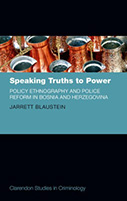Speaking Truths To Power: Policy Ethnography And Police Reform In Bosnia And Herzegovina

Author: Jarrett Blaustein
Publisher: Oxford University Press, 2015. 243p.
Reviewer: Amelia Padurariu | July 2017
Jarrett Blaustein’s book is a must-read for those interested in police development assistance in transition settings, and in particular police reform projects at the local level, such as community-based policing. He approaches his analysis through an ethnographic lens, with the specific aim to shed light on the relationship between global liberal governance, global-local influences on policing (i.e. glocal policing) and police capacity building projects. Policy translation (of international norms within the local setting) is used to this end as the overarching conceptual focus, in order “to study institutional dynamics of convergence, modification, and resistance associated with interactive globalization” (p. 3).
Against this background, Blaustein builds a convincing conceptual framework to support the aims of the book and his research findings. The conceptual framework he builds is skillfully elaborated, put together in an original manner, by drawing from a diverse range of connected literatures and supported later on by the analyses of the case studies. As a result, both the theoretical part and the empirical part of the book are highly insightful. The conclusion flows naturally from the conceptual framework and empirical analyses of the book.
Furthermore, the use of an ethnographic approach to the research has specific value, as it allows the reader to obtain a unique insight into (cultural and contextual factors affecting) the implementation of police reform at the local level. In addition, it is specifically the insight provided by an ethnographic approach coupled with the analysis of policy translation that supports the idea of “speaking truth to power” present in the title of the book. Moreover, the focus on policy translation is aptly chosen for the research: not only does it allow for an examination of the interactions among various policy stakeholders, but it also fits with current thinking in international circles about the suitability of implementing internationally accepted norms for police reform in particular post-conflict countries.
By way of two specific case studies of community-based policing, i.e. the Safer Communities project managed by UNDP in designated pilot areas in Bosnia, and the implementation of a Swiss community policing model in Sarajevo canton, managed by the Swiss Agency for Development and Cooperation, the author delves into the practice of policing at the local level in Bosnia. For instance, he reveals the programmatic challenges encountered by project implementers in designing and managing local policing projects, notably due to the strong dependency of project implementation on highlighting the value of (short-term) project outputs to donors. However, he also observes the policy mediating role of international development workers and local police officers in addressing the interests of donors and local communities and, to a certain extent, their ability to meet both concerns.
In general, one possible critique of the book is that the choice of Bosnia as the focus of the empirical analysis is not essential to the conceptual framework, apart from its post-conflict/ transitional nature. This means that the theoretical approach of the book has value in being refined and applied to other settings where international assistance to local policing is underway. The case of Bosnia is useful, however, in demonstrating a practical analysis of the elements posed by the theoretical part of the book. This is due to the case study’s specific dynamics at the local level, and considerable international assistance devoted to it. While Blaustein argues that the two selected case studies of community-based policing which he examines in the book are not representative of an entire field, nor sufficient to draw a theory of transnational policing, he does reveal aspects that can certainly contribute in this direction. Clearly, the insight provided by the case studies required from the author a great deal of involvement and thought put into research design, data collection and subsequent analysis. In doing so, he introduces the reader to a subtle world of interactions between the global and the local.
Amelia Padurariu is an Associate Researcher at the Free University of Brussels (VUB).


